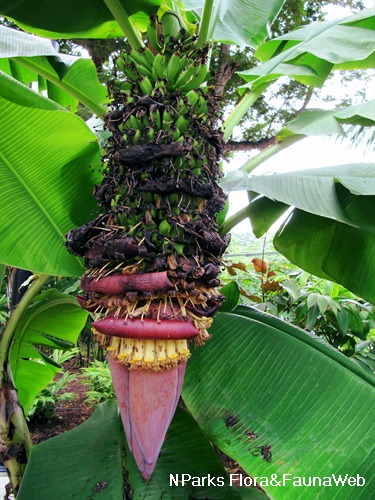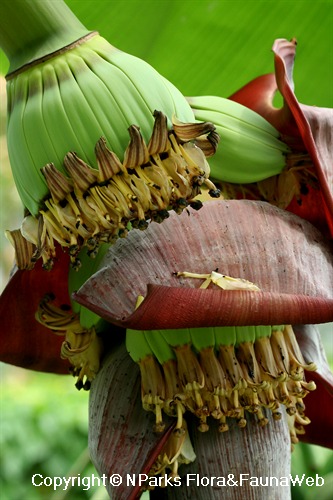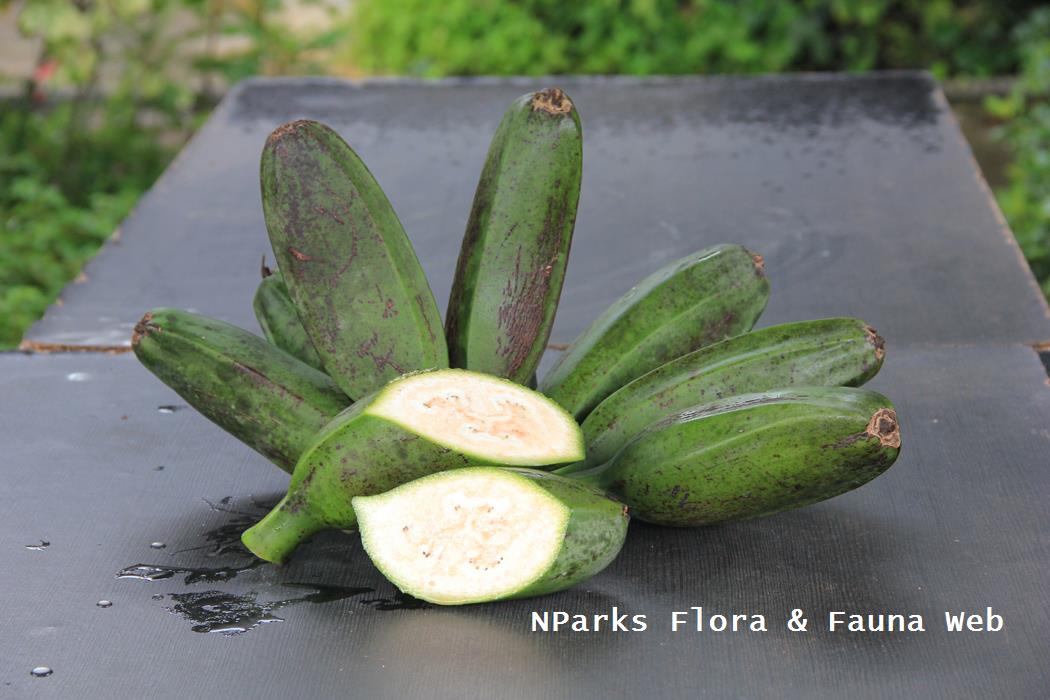.jpg)
Back
Musa 'Thousand Fingers'
| Family Name: | Musaceae |
| Common Name: | Thousand Fingers Banana, Pisang Seribu |
Name
Classifications and Characteristics
| Plant Division | Angiosperms (Flowering Seed Plants) (Monocotyledon) |
|---|---|
| Plant Growth Form | Herbaceous Plant |
| Lifespan (in Singapore) | Perennial |
| Mode of Nutrition | Autotrophic |
Biogeography
| Native Habitat | Terrestrial |
|---|---|
| Preferred Climate Zone | Tropical |
Description and Ethnobotany
| Growth Form | Large herb to 4m tall |
|---|---|
| Flowers | Inflorescence to 3m in length, purportedly bearing up to 1,000 'fingers' or individual fruits, from which the name for this cultivar has been derived. |
| Etymology | The common name in Bahasa Melayu (Malay) 'Pisang Seribu' and 'Thousand Fingers' (coined by growers in Florida) both refer to the enormous number of fruits borne by the plant |
Landscaping Features
| Desirable Plant Features | Ornamental Flowers, Ornamental Fruits |
|---|---|
| Landscape Uses | Parks & Gardens, Small Gardens |
| Thematic Landscaping | Bird & Wildlife Garden |
| Usage Hazard - Cons | Large Heavy Fruits |
Fauna, Pollination and Dispersal
| Fauna Pollination Dispersal Associated Fauna | Bird-Attracting Plant, Bat Food |
|---|---|
| Pollination Method(s) | Biotic (Fauna) |
Plant Care and Propagation
| Light Preference | Semi-Shade |
|---|---|
| Water Preference | Lots of Water, Moderate Water, Occasional Misting, [Remarks] (Prefers growing areas with high humidity) |
| Plant Growth Rate | Fast |
| Rootzone Tolerance | Moist Soils, Well-Drained Soils, Fertile Loamy Soils, Easy to Grow |
| Planting Remarks | The lengthening inflorescence may need to be provided with mechanical support to help the plant cope with the sheer weight of the fruits. The 'fingers' (fruits) should be removed as soon as they ripen if one does not intend to allow birds, squirrels or bats to feed on the fruits. |
| Fertilizing | The plant should be given ample amounts of fertilizer once it starts to produce pups or flowers. Regular feeding is essential to ensure that the plant is able to sustain flowering/ fruiting. |
| Pest(s) | Chewing Insects, Sucking Insects |
| Propagation Method | Sucker |
Foliar
| Foliage Retention | Evergreen |
|---|---|
| Mature Foliage Colour(s) | Green |
| Mature Foliage Texture(s) | Smooth |
Floral (Angiosperm)
| Flower Colour(s) | Pink, Purple, Yellow / Golden |
|---|---|
| Flower Texture(s) | Waxy |
| Flower Grouping | Cluster / Inflorescence |
| Flower Lifespan on Plant | Several Months |
Fruit, Seed and Spore
| Mature Fruit Colour(s) | Yellow / Golden |
|---|
Image Repository
Others
| Master ID | 31563 |
|---|---|
| Species ID | 5962 |
| Flora Disclaimer | The information in this website has been compiled from reliable sources, such as reference works on medicinal plants. It is not a substitute for medical advice or treatment and NParks does not purport to provide any medical advice. Readers should always consult his/her physician before using or consuming a plant for medicinal purposes. |

.jpg)
.jpg)










.jpg)